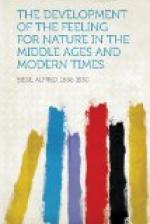[Footnote 8: Gessners Schriften. Zurich, 1770.]
[Footnote 9: Spalding, Die Bestimmung des Menschen. Leipzig, 1768.]
[Footnote 10: Klopstock’s Briefe. Brunswick, 1867.]
[Footnote 11: Comp. Odes, ‘Die Kunst Tialfs’ and ‘Winterfreuden.’]
[Footnote 12: Briefe.]
[Footnote 13: Julian Schmidt.]
[Footnote 14: Comp. his letters from Switzerland, which contain nothing particular about the scenery, although he crossed the Lake of Zurich, and ‘a wicked mountain’ to the Lake of Zug and Lucerne.]
[Footnote 15: Claudius, who, at a time when the lyric both of poetry and music was lost in Germany in conventional tea and coffee songs, was the first to rediscover the direct expression of feeling—that is, Nature feeling. (Storm’s Hausbuch.)]
CHAPTER XI
[Footnote 1: I have obtained much information and suggestion from ‘Ueber die geographische Kenntnis der Alpen im Mittelalter,’ and ‘Ueber die Alpine Reiselitteratur in fruherer Zeit,’ in Allgem. Zeitung. Jan. 11, 1885, and Sept. 1885, respectively.]
[Footnote 2: Evagatorium 3, Bibliothek d. litterar. Vereins. Stuttgart, 1849.]
[Footnote 3: Bibliothek des litterar. Vereins. Stuttgart, 1886.]
[Footnote 4: Descriptio Larii lacus. Milan, 1558.]
[Footnote 5: Itinerarium Basil. 1624.]
[Footnote 6: Osenbrueggen, Wanderungen in der Schweiz, 1867; Entwickelungsgeschichte des Schweizreisens; Friedlaender, Ueber die Entstehung und Entwickelung.]
[Footnote 7: Comp. Erich Schmidt, Richardson, Rousseau, and Goethe. Jena, 1875.]
[Footnote 8: Remarks on several parts of Italy. London, 1761.]
[Footnote 9: Letters of Lady M. Wortley Montagu, Sept. 25, 1718.]
[Footnote 10: Friedlaender, op. cit.]
[Footnote 11: Schmidt. Moser’s description of a sensitive soul in Patriotischen Phantasien is most amusing.]
[Footnote 12: Laprade adduces little of importance in his book Le Sentiment de la Nature (2nd edition), the first volume of which I have dealt with elsewhere. I have little in common with Laprade, although he is the only writer who has treated the subject comprehensively and historically. His standpoint is that of Catholic theology; he never separates feeling for Nature from religion, and is severe upon unbelievers. The book is well written, and in parts clever, but only touches the surface and misses much. His position is thus laid down: ’Le vrai sentiment de la Nature, le seul poetique, le seul fecond et puissant, le seul innocent de tout danger, est celui qui ne separe jamais l’idee des choses visibles de la pensee de Dieu.’ He accounts for the lack of any important expressions




